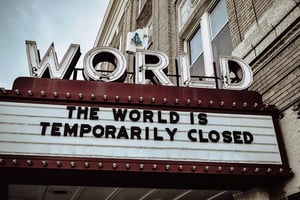One of the key questions, when we create the Intelligence Function in the organization, is "What do...
The Time Machine: Scenario Planning and Competitive Intelligence
"This present used to be the unimaginable future" (Stewart Brand)
If your organization has a vocation for long-term survival or is a corporate group that must cope with impact investments also in the long term, we will deal here with a problem which interests us: Minimizing uncertainty about the future.
Almost all of us would like to know what is going to happen in our business environment. We cannot see into the future, but we can establish prospective methods for making decisions better informed now. Decisions that will affect our business, whether they are large investments, opening new markets, diversification of products...
There are things that we know about the future - such as the ageing of the population. Other things that we know we do not know - such as how energy regulation in Spain will evolve. And above all, others that we are unaware that we don't know, which are the most numerous. Scenario Planning is a method that allows us to manage uncertainty, by supporting decisions that have an impact in the long term. It does not predict what is going to happen, but it generates a "history of the future" that is evolving, and that allows us to learn from it in the same way that we learn from the history of the past. Actually, it constructs several "future" parallel stories, which we confirm or discard, and evolve as we capture information about the environment.
Scenario Planning is a method that allows us to manage uncertainty, by supporting decisions that have an impact in the long term. It does not predict what is going to happen, but it generates a "history of the future" that is evolving, and that allows us to learn from it in the same way that we learn from the history of the past. Actually, it constructs several "future" parallel stories, which we confirm or discard, and evolve as we capture information about the environment.
To do this we must identify mechanisms of change in our environment - change drivers- affecting our problem or critical decision in the long term. These mechanisms of change will be selected and managed using a matrix, depending on the strategic implications for our business. These change drivers will be different according to the profile of our organization: What is our sector, whether it is very regulated, whether we rely on raw materials, whether we have consumer products, whether our market is - or will be - national or international...
Monitoring the evolution of these mechanisms of change and their influence on the designed scenarios will be the core of a  method that will allow us to shed a little light on the uncertainty in the long term.
method that will allow us to shed a little light on the uncertainty in the long term.
You may have already guessed that this prospective method establishes a close symbiosis with Competitive Intelligence: Scenario Planning is to Competitive intelligence what the Strategic Plan is to true Innovation.
Indeed, we do not need to have a Strategic Plan to govern the process of innovation. However, we run the risk of choosing very interesting ideas, but which in the long term divert us from what we want to be. We have already tried to deal with this risk in Cloud Atlas: The divorce of Strategy and Innovation. In the same way, Scenario Planning is not necessary for designing our Competitive Intelligence. But Scenario Planning will allow us to identify what the critical monitoring factors are that we must take into account in the long term.
But, furthermore, Scenario Planning is intended to support the organization's Strategy: It will help us to identify what we should do, and since we cannot do everything, it will help us to decide what we will do eventually.
For Scenario Planning to be sustainable and agile, we must base it on Competitive Intelligence and platforms for information management that will help us to structure and automate the process.
(The Time Machine is a George Pal film that premiered in 1960, based on a novel by H.G. Wells).
Antara undertakes that the published content is created by its own team, customers or partners. Antara never outsources content generation. The opinions of the authors reflect their own views, and not those of the company.





